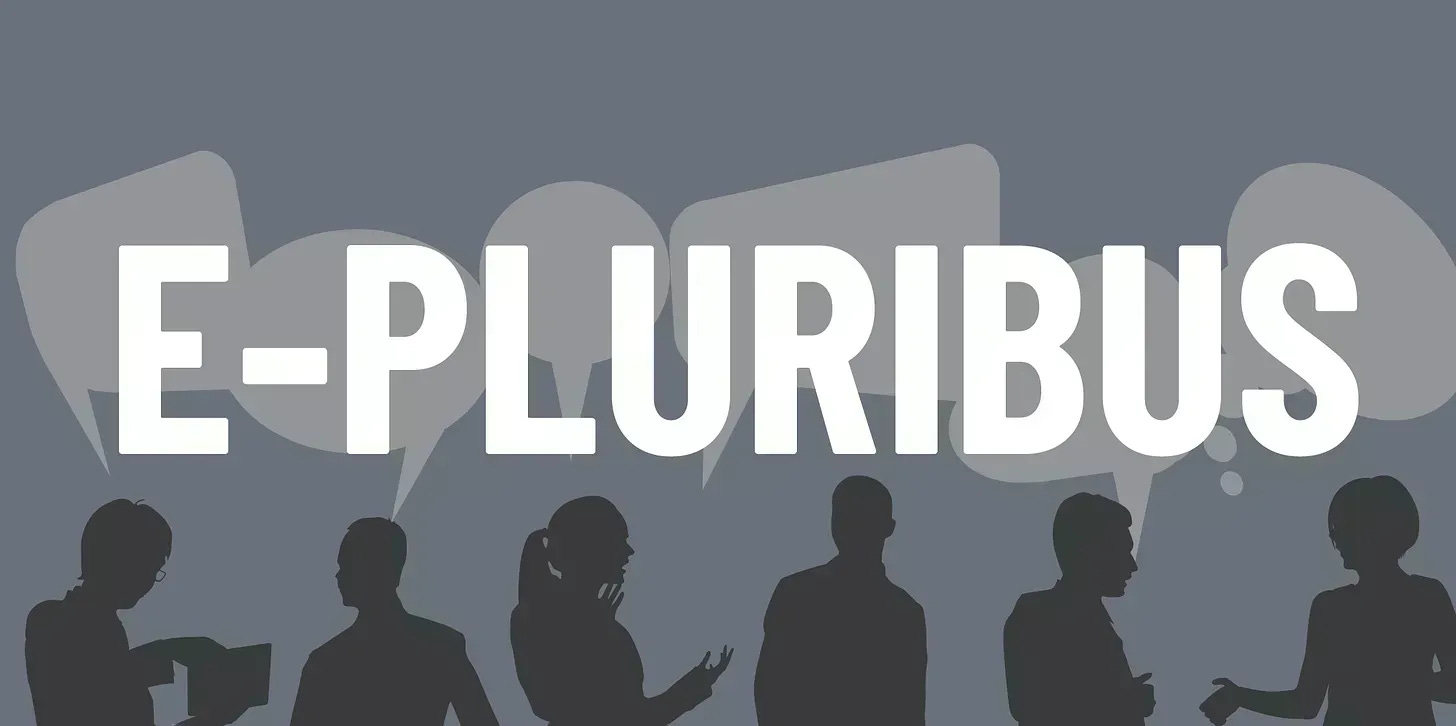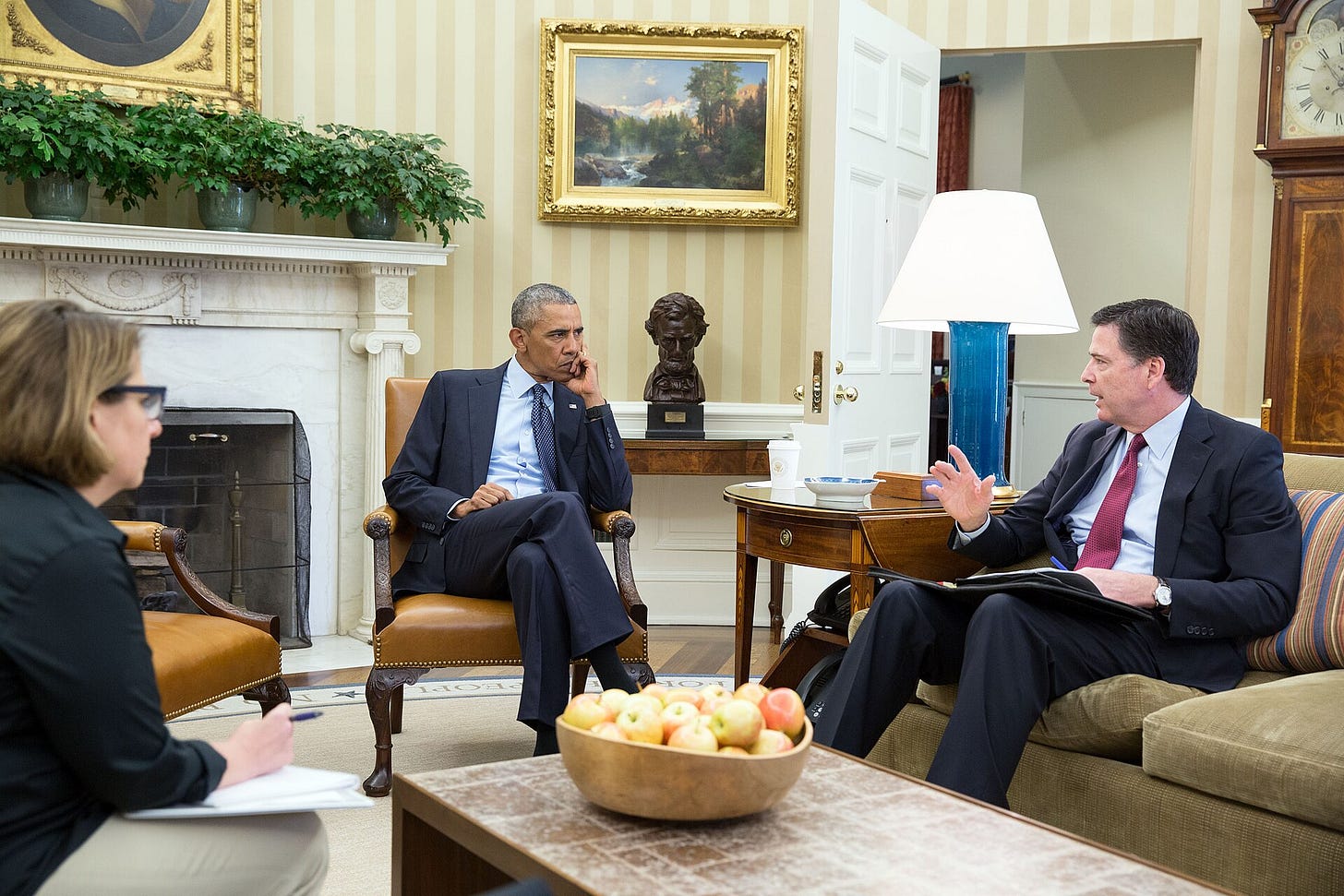E-Pluribus | May 19, 2025
Comey's reckless but protected speech. Could AI be a 'shadow censor'? College backs Salman Rushdie's right to speak
A round-up of the latest and best musings on the rise of illiberalism in the public discourse:
Brad Polumbo: James Comey can’t be prosecuted for a reckless Instagram post
Betraying a lack of common sense, former FBI director James Comey recently posted an image on Instagram that read, “86 47,” with “86” being a slang term for “get rid of” and “47” referring to Donald Trump, 47th US president. Comey deleted the post after learning that “86” could have violent overtones, but that didn’t stop National Security Director Tulsi Gabbard from implying that the former FBI director should go to prison.
Writing for the Washington Examiner, journalist Brad Polumbo reminded Gabbard that Comey’s post — “reckless and contemptible as it may be” — is still protected by the Constitution:
… Gabbard has long positioned herself as a champion of free speech. But she just went on national television as a Trump administration official and suggested that one of the president’s political opponents should be prosecuted for speech that, reckless and contemptible as it may be, is protected by the First Amendment.
The controversy all started when former FBI Director James Comey posted an image on Instagram that read, “86 47,” with “86” being a slang term and “47” referring to President Donald Trump, the 47th president of the United States. According to Merriam-Webster, “86” originates in the food service industry and is “slang meaning ‘to throw out,’ ‘to get rid of,’ or ‘to refuse service to,’” but it is also sometimes used to mean “to kill.”
Naturally, this cryptic post from such a high-ranking former official set off alarm bells online. And given the multiple assassination attempts against Trump and an alarming degree of public support for political assassinations, it is reckless and reprehensible for any current or former public official to be so careless with his public speech. Comey has since deleted the post and claimed he did not know the phrase was associated with violence. But can Comey be prosecuted and imprisoned for it?
That’s what Gabbard suggested on Fox News, telling host Jesse Watters that Comey should “be held accountable and put behind bars” for what she called “a veiled call to action to murder the sitting president of the United States.”
Of course, everyone, including Trump officials, is free to criticize Comey for his post. But the Trump administration can’t prosecute Comey for what he shared on Instagram, at least not without trampling on free speech and violating the First Amendment.
Brendan McCord, Greg Lukianoff, Philipp Koralus: Will AI Kill Our Freedom To Think?
Like other powerful technologies, artificial intelligence (AI) can help promote flourishing or totalitarianism. Which of these paths AI follows will depend heavily on how we employ and regulate it. At Reason, Brendan McCord, Greg Lukianoff, and Philipp Koralus outline the steps humanity needs to take to ensure that AI remains a liberty-friendly partner of truth seeking:
The current iteration of AI already edits our emails, sorts our inboxes, and picks the next song we listen to. But convenience is just the start. Soon, the same technology could determine which ideas ever reach your mind—or form within it.
Two possible futures lie ahead. In one, artificial intelligence becomes a shadow censor: Hidden ranking rules will throttle dissent, liability fears will chill speech, default recommendations and flattering prompts will dull our judgment, and people will stop questioning the information they're given. This is algorithmic tyranny.
In the other, AI becomes a partner in truth seeking. It will surface counterarguments, flag open questions, draw on insight far beyond any single mind, and prompt us to check the evidence and sources. Errors will be chipped away, and knowledge will grow. Our freedom to question everything will stay intact and even thrive.
The stakes couldn't be higher. AI currently guides about one-fifth of our waking hours, according to our 2024 time-use analysis. It drafts our contracts, diagnoses our diseases, and even ghostwrites our laws. The principles coded into these systems are becoming the hidden structure that shapes human thought.
Throughout history, governments have banned books, closed newspapers, and silenced critics. As Socrates discovered when sentenced to death for "corrupting the youth," questioning authority has always carried risks. AI's power to shape thought risks continuing one of humanity's oldest patterns of control.
The goal hasn't changed; the method has.
Emell Derra Adolphus: Salman Rushdie Scared Away From College Speech After Uproar
Renowned novelist and outspoken critic of Islam Salman Rushdie abruptly cancelled a commencement speech at Claremont McKenna College following intense backlash from some Muslim students and advocacy groups. Whatever your opinion of Rushdie, we were heartened to see the school maintain its commitment to free speech. Daily Beast has the details:
Claremont McKenna College President Hiram Chodosh wrote in a campus-wide email Tuesday that Rushdie, 77, had decided to withdraw as graduation keynote speaker for its May 17 ceremony, the Daily Bulletin reported.
“This decision was his alone and completely beyond our control,” Chodosh wrote. “We remain steadfast in our commitment to Sir Salman’s visit to CMC and have extended an open invitation to him to speak on our campus in the future.”
The cancellation came as student and local Muslim advocacy groups called the author’s presence “disrespectful” after he said pro-Palestinian protests across college campuses were akin to supporting “a fascist terrorist group,” The Guardian reported last year.
“I’m surprised, relieved and happy,” Claremont Colleges Muslim Students Association president Kumail Afshar said about Rushdie’s decision.
Rushdie, an Indian-born British and American atheist, was forced into hiding by the outrage over his 1988 novel The Satanic Verses, in which he suggests Islam’s Prophet Muhammad may have entertained polytheism.
Around X
The Foundation for Individual Rights and Expression (FIRE) takes on all challenges to free speech—even restrictions on doormats, which actually exist at UC Irvine.
Adam Smith’s “great-great-great granddaughter” with a pithy take down of the free-speech-not-hate-speech trope so many people still fall for:
The New York Times laments the government’s cuts to online misinformation research. Chris Rufo doesn’t buy it. The last administration was funding studies to justify its censorship campaign, he says, and America is better off without that kind of “scientific inquiry.”









